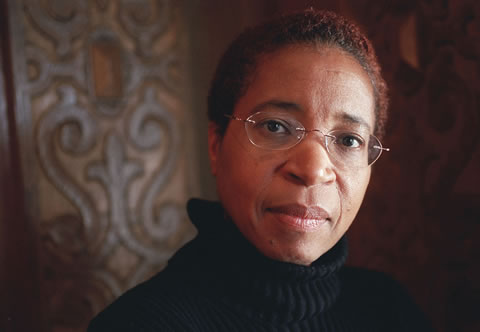A writer engagé is how the poet, novelist and essayist Dionne Brand defines herself, by which she means, of course, engaged with the world’s big issues. But the French term also means “busy” and Brand is certainly that as well. When I speak to her, she’s just sent her new collection of poems, Ossuaries (McClelland & Stewart), off to the publisher – “not as dark … as the title makes it sound.” She’s collaborating with Ottawa’s National Arts Centre to turn her 2002 collection, thirsty, into a drama. And, as Toronto’s new poet laureate, she’s just penned paeans to the winners of local human rights awards and to a rejuvenated Jameson Avenue, while working at getting assorted bronzed lyrics inlaid into the city’s sidewalks – “We want to have poetry in that moment between the doughnut shop and car dealership, speaking through the cacophony of consumerism.”
It’s phrases like this—“the cacophony of consumerism”—that show Brand’s intellectual roots. The U of T she came to from her native Trinidad in the 1970s was a charged campus, where Vietnam, human rights and the curriculum were all subjects for heated debate. She took the school’s first feminist and black literature courses, held at New College, and fell under the thrall of the then trendy existentialists. “It was writers who had some part in the foment who spoke to me, this grand old tradition of engaged writers like Sartre and Camus,” says Brand, who earned a BA in English and philosophy in 1975 from U of T Mississauga, and an MA in 1998 in the philosophy of education from OISE. (She now teaches at the University of Guelph.)
In her work, she’s focused on the American invasion of Grenada (she dedicates poems to leaders of the socialist coup), slavery, suicide bombing, Guantanamo. But the personal gets as much space as the political in her best work – strewn throughout her pieces are moments of dreamy other-worldliness. A line from her virtuoso 1997 collection, Land to Light On: “There are rooms across this city full/of my weeping.”
Her pieces are also periodically studded with references to her beloved jazz (“Only Sarah Vaughan thank god sings in this snow”), with the new collection, out in March, riffing on the work of the genre’s mid-20th century giants. “They stretched beyond what their time allowed them; in a way, it’s still future music. When you listen, you think when was that made?” While Brand generally engages with the here and now, she also has her eyes on posterity. “What I want to see is what’s beyond [the events of history]. Hopefully, my work can also leap beyond this particular moment.”
Brand reads from her collection Thirsty






